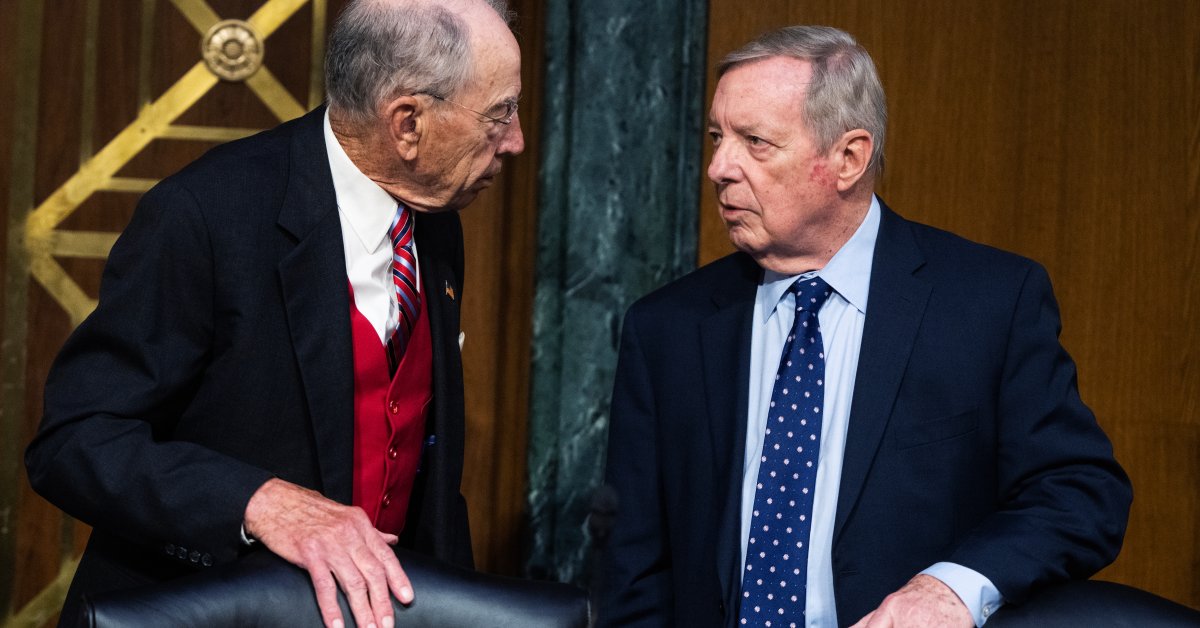The FBI allegedly instructed agents to “flag” any mention of President Donald Trump while reviewing files related to the late sex offender Jeffrey Epstein earlier this year, according to a letter sent Friday by Senator Richard Durbin to the heads of the Justice Department and FBI.
Durbin, the top Democrat on the Senate Judiciary Committee, said his office had received information that roughly 1,000 FBI personnel were put on 24-hour shifts in March to comb through approximately 100,000 documents connected to Epstein. Those agents, Durbin wrote, were instructed to identify and set aside any materials that referenced Trump.
The allegation raises new questions about whether political considerations have shaped how the Trump Administration has handled the ongoing review of Epstein-related evidence. Durbin’s letter, addressed to Attorney General Pam Bondi, FBI Director Kash Patel, and Deputy FBI Director Dan Bongino, seeks answers about who gave the flagging directive, what happened to the materials once flagged, and whether other individuals were similarly singled out.
“This effort,” Durbin wrote, “was haphazardly supplemented by hundreds of FBI New York Field Office personnel, many of whom lacked the expertise to identify statutorily-protected information regarding child victims and child witnesses or properly handle FOIA requests.”
“My office was told that these personnel were instructed to ‘flag’ any records in which President Trump was mentioned,” he added.
The Illinois Democrat also questioned the timeline of the review process, noting that despite tens of thousands of personnel hours, the Justice Department took “more than three additional months” to announce in a July 7 memo that there was “no incriminating client list” among the materials. He requested a detailed explanation of how that conclusion was reached and whether it matched what agents observed during the March document review.
Durbin’s letter comes amid renewed pressure on Bondi to release more of the Epstein documents. On Friday, Bondi said she would ask a federal court to unseal additional grand jury transcripts from the sex-trafficking investigation, following a directive from Trump. Trump said on Truth Social Thursday evening that he wanted “any and all pertinent Grand Jury testimony” released and claimed that past Democratic administrations had hidden the truth.
Still, some lawmakers and right-wing activists have cautioned that grand jury materials are unlikely to contain many of the documents the public expects. “Nice try @AGPAM Bondi,” Rep. Dan Goldman, Democrat of New York and a former federal prosecutor, posted on X, calling the move a distraction from the broader unreleased record, which likely includes agent interviews, seized devices, photographs, and communications.
Trump’s request to Bondi came soon after The Wall Street Journal reported that Trump contributed a “bawdy” letter, featuring a drawing of a naked woman, to Epstein’s birthday album in 2003. The letter reportedly ended with the line: “Happy Birthday—and may every day be another wonderful secret.” Trump has denied writing the note and has threatened to sue the Journal, NewsCorp, and Rupert Murdoch.
Bondi has previously indicated that the FBI withheld large volumes of Epstein-related evidence from her office, including a “truckload” of documents delivered only after she demanded full access earlier this year. A partial release in February revealed an evidence log listing more than 300 gigabytes of data seized from Epstein’s residences, including digital devices, cash, massage tables, and travel records. That log made no mention of the birthday album.
Epstein, a financier with connections to global elites, was arrested in July 2019 on federal sex trafficking charges. He died a month later in a Manhattan federal jail, in what officials ruled a suicide. His longtime associate Ghislaine Maxwell was convicted in 2021 and is serving a 20-year prison sentence.
For years, Trump and his allies, including Patel and Bongino, promoted conspiracy theories about Epstein’s death and suggested that damaging evidence would eventually surface, implicating political opponents. But now, with Trump back in office and key allies leading the agencies in charge of the investigation, some of his own supporters have grown skeptical of the Administration’s handling of the case.
In Congress, Democrats and a growing number of Republicans have expressed support for a measure calling on the Administration to release everything it has related to the Epstein case. Durbin’s letter signals a new phase in congressional oversight of the investigation, shifting focus from demands for disclosure to questions about whether the review process itself has been compromised.
“The American people deserve to know whether political considerations played a role in the review and release—or suppression—of records related to one of the most disturbing sex trafficking investigations in our nation’s history,” Durbin wrote.

